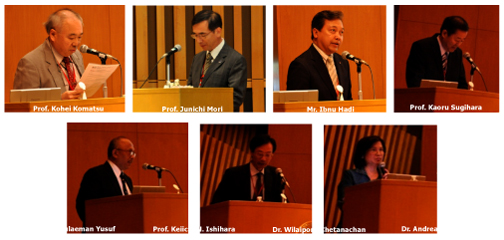Events
The 2nd International Conference on Sustainable Future for Human Security
(SustaiN' 2011)
Date: October 8 - 10, 2011
Venue: Kihada Hall - Uji Campus, Kyoto University
Organized by:
Indonesian Student Association of Kyoto and Indonesian Student Association of Kansai
Co-hosted by:
- Kyoto University (KU)
- KU Global COE Program “Global Center for Education and Research on Human Security Engineering for Asian Megacities (HSE)
- KU Global COE Program on Energy Sciences
- KU Center for Southeast Asian Studies (CSEAS)
- KU Research Institute of Sustainable Humanosphere (RISH)
The detailed information is here.
Number of attendants: around 300
Presenters: altogether 162 technical presentations
Poster
Report 154
Outline
The purpose of the 2nd International Conference on Sustainable Future for Human Security (or SustaiN' 2011) is to provide a forum for international researchers community to discuss, share and exchange their latest research progress in relation with sustainable future issues; to develop and promote a sustainable networking between participants to hold human securities and bridging ideas into policies and desired realities; to broaden information access for scientific communities toward global, scientific, technology and engineering societies; and to empower Asian in general and South East Asia in particular for research collaboration, network and partnership among researcher communities and decision makers.
Report
The 2nd Sustain Conference was held at Kihada Hall - Uji Campus, Kyoto University, on October 8-10, 2011. This conference was organized by the Indonesian Student Association in Kyoto and Kansai. The chairman of the organizing committee was Mr. Yulianto P. Prihatmaji from Kyoto University. There were four main activities that be undertaken during this conference (1) International Conference, (2) Poster session, (3) Integrated Workshop and Policy Discussion on Sustainable Post-Disaster Recovery, and (4) Cultural Program to promote Indonesian-Japanese cultural.
The conference was opened by Prof. Kohei Komatsu. He welcomed all the participants and highlighted the importance of this event for our common future. In this light, he also explained why this event is also designated as the 186th Symposium on Sustainable Humanosphere. Continuing the statement by Prof. Kohei Komatsu, Prof. Junichi Mori extends his gratitude for the support from international community after the Great Kanto Earthquake, in March this year. As a conclusion, he reminded all participants that this symposium deals with one important topic for the 21st Century: Sustainability. Last but not least, Mr. Ibnu Hadi from Indonesia’s General Consulate in Osaka expressed his support for this important event.
The Opening Ceremony was concluded by a symbolic choir of Indonesia’s traditional music instrument made from bamboo, angklung, marked the beginning of the 2 day event. After the opening ceremony, there was keynote speech session from 5 presenters. Prof. Kaoru Sugihara has presented the Sustainable Humanosphere in Asia and Africa – An Interdisciplinary Approach. He mentioned the importance of paradigm shift relating to the Sustainable Humanosphere: from the land-based to the humanosphere-based, the temperate zone-centered perspective to the tropics centered perspective, and the production-based perspective to the livelihood-based perspective. Mr. Eddy Sulaeman Yusuf has presented the Global Crisis and Indonesia. Regarding this issues he mentioned the risk factors and the sustainability in the economic side. In addition, Prof. Keiichi N. Ishihara has presented the Strategic Energy Scenario in Japan and Thailand and Dr. Wilaiporn Chetanachan presented the SCG Energy Strategy and Technology Development. The last presenter in this keynote speech session was Dr. Andreas Raharso. He mentioned the human interaction and how it affects the sustainability of Asia’s future livelihood.
Around 300 people attended the conference from 15 countries, Asia and Europe, including Japan, Indonesia, Malaysia, Taiwan, Hongkong, Thailand, Netherlands, Germany, South Korea and Iran. The participants' presentations were categorized into 7 (seven) topics: (1) energy and environment, (2) sustainable agriculture, (3) sustainable cities and rural in tropical hemisphere countries, (4) advance technology, (5) natural hazard, (6) molecular and genetic approaches in human diseases management, and (7) social science. For each topic, one or two invited speakers gave important presentations to the audience. The invited speakers were mostly the lecturers of Kyoto University, and several others came from the Indonesian Consulate General Osaka, Bank of Indonesia in Tokyo, and from SCG Group of Thailand.
In general, this conference was a success. Around 154 extended abstracts were presented in this conference. One important note of this event is that the presenters were mostly M.Sc and Ph.D students who have the desire to promote their study achievements to the international community. GCOE-HSE supports activities like this and this event was a substitute for the Young Researchers Seminar, which is normally conducted once a year on the topic of Human Security Engineering in Indonesia. Since this event was attended by prominent individuals from Indonesia and Japan, new cooperation plans in education and research sectors between both countries were discussed informally. It is hoped that this event will strengthen the friendship and cooperation between both countries for the future.

